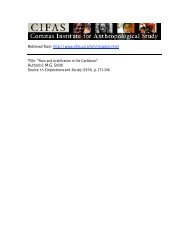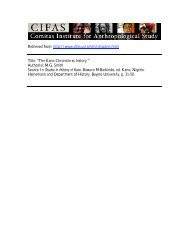e - CIFAS
e - CIFAS
e - CIFAS
Create successful ePaper yourself
Turn your PDF publications into a flip-book with our unique Google optimized e-Paper software.
6+ GOVERNMENT IN ZAZZAU<br />
household officials and the public orders were heavily buttressed<br />
by other factors, such as rank-order and precedence, functional<br />
differentiation, and especially, perhaps, by the promotional linkages.<br />
Through this promotional system, all holders ofsubordinate<br />
office including slaves were motivated to regard their present<br />
appointment as a stepping-stone to higher positions in which their<br />
economic independence wouW increase together with their rank<br />
and responsibilities, whether these were civil or military in character,<br />
or political or administrative in form. Of themselves these<br />
promotional arrangements coIl8iderahly reduced the dangers which<br />
faced the governmental structure through the development of an<br />
unbridled competition for economic reward among its officials.<br />
But the way in which the distribution of political and administrative<br />
functions was associated with this economic differentiation<br />
of offices was of equal significance for the continuity of the<br />
system.<br />
In Ahuja, as freemen the king's household officials were eligible<br />
for promotion firstly to the Tafl.lUna rank, and thence to the principal<br />
office of Madawaki: hut, so long as they remained household<br />
officials they were completely dependent on the king for official<br />
rewards. None the less, in M. Hassan's words, 'the whole country<br />
was theirs, as they appointed the other (i.e. public) officials'.l This<br />
implies that the household officials shared in the king's official<br />
income, and had no need of separate remuneration, since their<br />
control of appointments itself guaranteed their income. As noted<br />
above, the vote of these household officials was decisive in council,<br />
and their leader, the Sarkin Fada, had the power to veto proposals<br />
made by the Madawaki on behalf of the public orders. Only in<br />
cases of deadlock: between his public and household councils was<br />
the king free to act summarily; otherwise he was obliged to take<br />
counsel first with the household officials, and whether or not agreement<br />
was reached, in matters of public interest, with the public<br />
orders also. In this way the king couLd appeal to the public orders<br />
under the Madawaki. and the GaJadima for support against the<br />
advice of the household officials under the Sarkin Fada. At the<br />
same time, as M. Hassan tells us, the Madawaki and the Sarkin<br />
Fada would sometimes arrange privately beforehand to override<br />
the king with joint proposals.<br />
The position of the household officials in this political system<br />
1 M. Haesan, pe11Ional communication. See Appendix A.<br />
GOVERNMENT IN NINETEENTH~CENTURYABUJA 6s<br />
under their head, the Sarkin Fada, was certainly a strategic and<br />
noteworthy one. It cannot be explained simply in terms of a tripartite<br />
division of political power. In such a system agreement<br />
between two ofthese three political units would be both necessary<br />
and decisive for policy formation. But even within the tripartite<br />
political structure of Abuja there was room for a wide variety of<br />
alignments, consequent on the multiplicity of segmentary principles<br />
which entered into its constitution. Moreover, the :Madawaki's<br />
council coIl8isted of two orders, the rukuni and Tawuna,<br />
whereas the Sarkin Fada's consisted of only one. Yet, apart from<br />
the royal succession, we are informed that whatever the issue, the<br />
Sarkin Fada, as head of the household officials, had power to veto<br />
proposals by the public orders directly, and was indirectly able to<br />
thwart the king's policy. This means that the household officials<br />
exercised an inftuence over official appointments and also over<br />
promotions and dismissals, which had definite policy implications.<br />
Thus although the economic conditions under which they held<br />
their offices were apparently unrewarding, the order of household<br />
officials, as the dominant political order within the state, had the<br />
least need of such economic prescriptions, and may have enjoyed<br />
the greatest security of official tenure. None the less, despite their<br />
political dominance in council, these household officials were<br />
economically dependent on the throne, and the king, by agreement<br />
with the public orders under the Madawaki, could promote<br />
individual members of this household order out of their strategic<br />
position, or simply dismiss them from otlice. On the other hand,<br />
these household officials occupied positions which allowed them to<br />
secure their own appointments to higher offices of rawuna or<br />
rukuni rank. These promotions involved a certain loss of political<br />
power, but they also carried high rank and prestige, substantial<br />
administrative responsibilities, increases in official income and<br />
economic independence. To obtain these individual goals, the<br />
household officials, especially their leaders, had to maintain good<br />
relations with their counterparts in the public administration, and<br />
also to keep in favour with the king. In this way, the promotion<br />
of these household officials was contingent on restraint in the use<br />
of their privileged political position.<br />
Differential political power and administrative responsibilities<br />
were linked with this economic differentiation of office in a significant<br />
manner. Under the king, those offices which exercised





